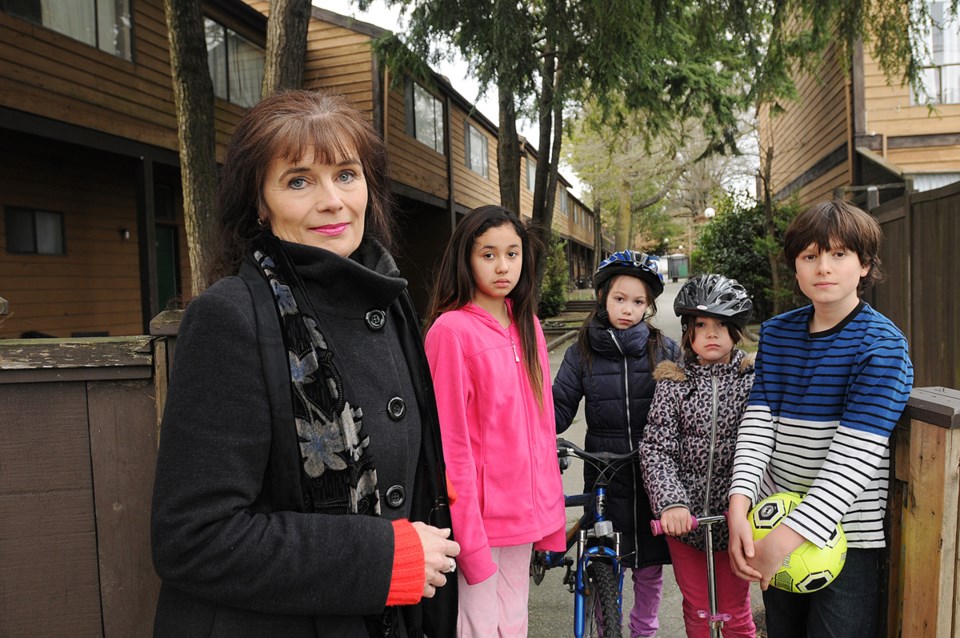When Jillian Skeet started her 10-year fight to keep her townhouse complex standing, she didn’t think it would end with her losing her home and her community.
“Where you guys are now, that’s where I was in 2009 and 2010,” Skeet told the Grandview-Woodland Area Council (GWAC) Monday night during a meeting focused on renters.
Skeet’s townhouse, along with 69 others in the Marine Gardens complex on Southwest Marine Drive, will be demolished this week to make way for a development that includes highrises.
“Vancouver has become a city of instability and anyone who is a renter lives with a growing fear that you don’t know if you have somewhere to live every month,” said Skeet, noting her neighbourhood was one of the first areas to get rezoned and redeveloped in the city’s recent push for densification.
She warned Grandview-Woodland community members they may face rezoning as a result of the city’s new community plan. The draft plan is set to be released on June 25.
The Grandview-Woodland area runs south of the Burrard Inlet to Broadway and is bounded by Clark Drive and Nanaimo Street. It includes several busy transit areas with Hastings Street, First Avenue, Commercial and Victoria Drive intersecting it.
It’s a story Vancouverites are all too familiar with: city plans for rezoning and increased development puts pressure on landlords to raise rent prices and leaves renters with hefty rent costs and possible evictions.
The 2011 Statistics Canada Census indicated 65 per cent of Grandview-Woodland residents are renters, some of whom fear the new neighbourhood plan could trigger mass evictions, homelessness and increased business with foreign buyers.
Many of the 50 people who attended the meeting raised concerns that even if the neighbourhood gains more housing through rezoning, it will lose renters because of high rent costs.
Area council members criticized Rental 100, a city program that gives incentives to developers to build rental housing. The program has been criticized because of the high rents in the buildings.
“We are offended the city thinks that $1,260 per month for a studio is affordable — it’s not affordable when we raise families on $28,000 a year,” said Kathleen Piovesan, an area council member.
Grandview-Woodland is home to several co-ops and social housing programs, said Shawn Preuss, board member of Entre Nous Femmes Housing Society. She said these programs are desperately needed in a community with mixed-income households.
With a new neighbourhood plan, Preuss suspects co-op buildings will have to be remortgaged and rented at market price, pushing people out.
The issue is not unique to Grandview-Woodland, Piovesan said. An absence of strong government rent control, sudden neighbourhood changes and “renovictions” have prompted several protests in recent years, including a sleepover at city hall last month and the #DontHave1Million Twitter campaign last year.
The area council asked for suggestions and solutions Monday night. The audience pitched ideas such as a Red Square campaign, similar to the 2012 Montreal student solidarity demonstration that protested tuition fee hikes. One person suggested 200 people occupy Trump Tower and force it to be revamped into low-income housing, topping out at $500 per month.
Others asked for “good practical tools we can use to put up a damn good fight,” while another called for landlords and the city to “own that they’re screwing us over and profiting off of it.”
“Housing is becoming many things; it’s a commodity, it’s a workplace for real estate agents, for us it’s a home,” said one young woman.
As for the former Marine Gardens residents, most have left Vancouver, Skeet said. With a 0.6 per cent vacancy rate city-wide, according to a 2015 Canada Mortgage and Housing
Corp report, and a growing instability in the city, Skeet thinks, “the city is being hollowed out. In 10 years I think it will become a bit of a ghost town.”
@biancachan_



